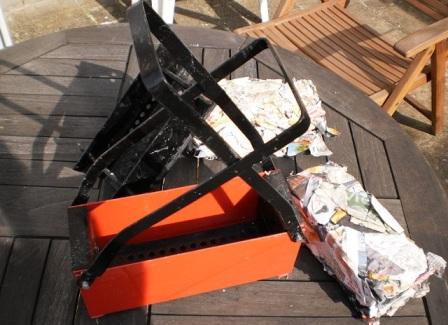There are (hand) presses to make paper briquettes. I have tried one: rip paper in a potato sack, and soak a few days in a tub of water. Let drain for several hours, press it in a form, and let it dry a few weeks (or months). Above the stove it naturally dries faster. So definitely not make a neat pile, but a airy one. You can stoke it in the stove together with wood.
 I also wet magazines folded into shape and pressed.
I also wet magazines folded into shape and pressed.
Also rolled them up, and let them dry with a rubber band around it.
Also just stacks of paper (without wetting) placed in the stove.
I notice at sight not really a difference, nor in burning, the duration of the burn, or the amount of ash. Stacked paper seems to burn longer and you need to rekindle the remains to get them completely burned. In all cases, scraps of paper (structure) and printing stay recognizable. My conclusion: I have sold the press, and use firewood.
Economically and ecologically it seems to me it should be better to recycle paper.
The more old paper is recycled already, the shorter the fibers. They are still used in newspapers and paper towels. Paper can be recycled two to five times.
Use of waste paper fibers, wood fibers instead of newly felled trees consumes more than five times less energy and water, and provides up to 75% less air pollution.
Horse manure briquettes
In the Middle Ages this was also used as fuel. The desert inhabitants (North Africa) still use manure from, among others, dromedaries.
Each horse is good for five tons of manure per year. A kilo of manure yields half a kilogram of dry fuel. Three-quarters of the energy value can be used (1/4 then serves for drying.) It burns well and is odorless.
If you have a lot of space, you can also simply dry and use the droppings.
The manure can be dried together with some straw and wood chips, which are usually in it, and pressed into briquettes. Then it is a profitable fuel. Too much straw impedes the cohesion. The intestinal mucus around the figs reduces the coherence in the pressed block. That is why it would be better to first add water and stir everything well (in a concrete mixer, for example).
You can make briquettes with a (preferably sturdy and heavy) paper press. Let them airy stacked for a month or 3 to dry.
One source states that a lot of chlorides would be released during (horse) fertilizer burning, as a result of which iron stoves will have a shorter life span.
